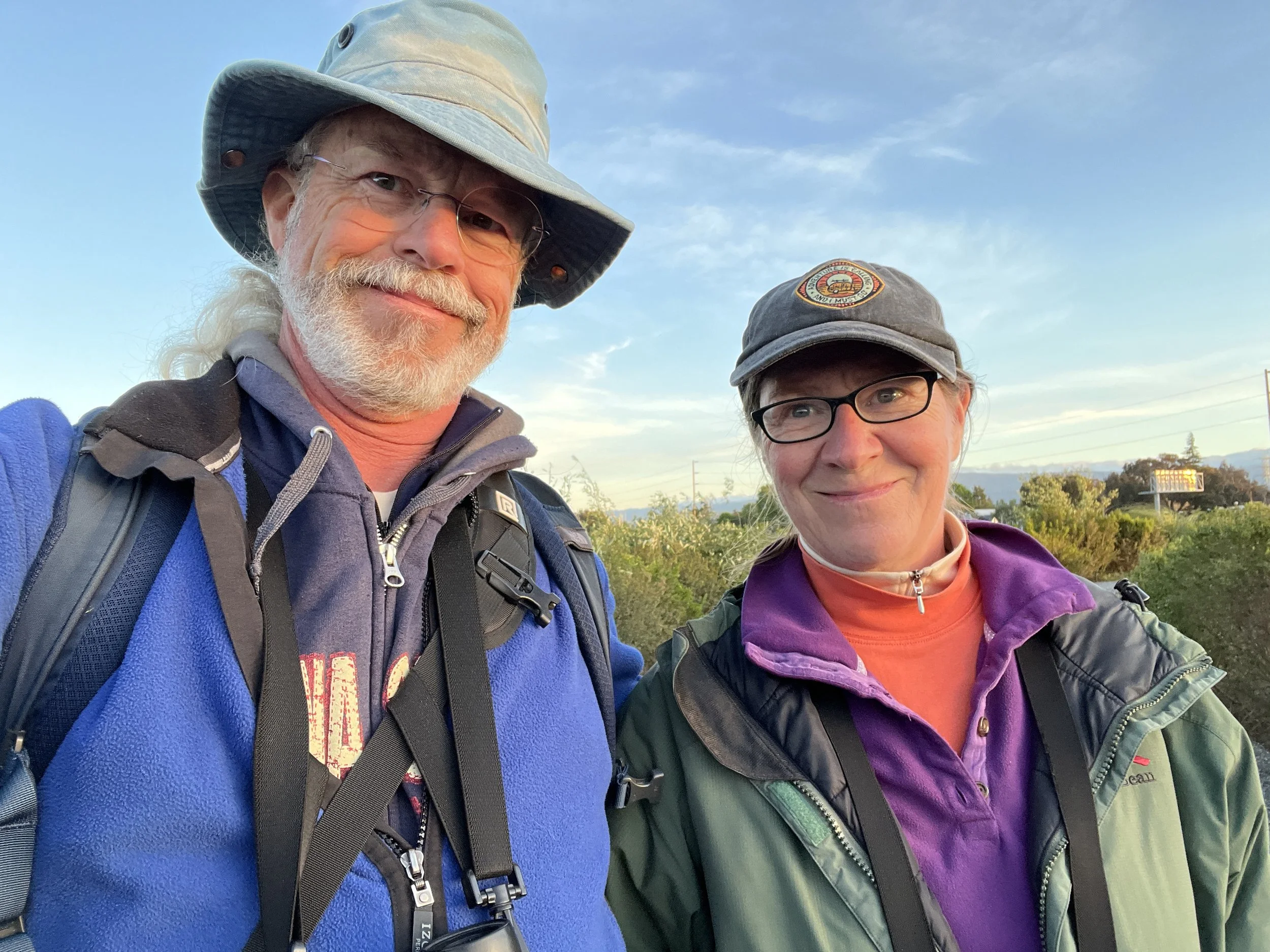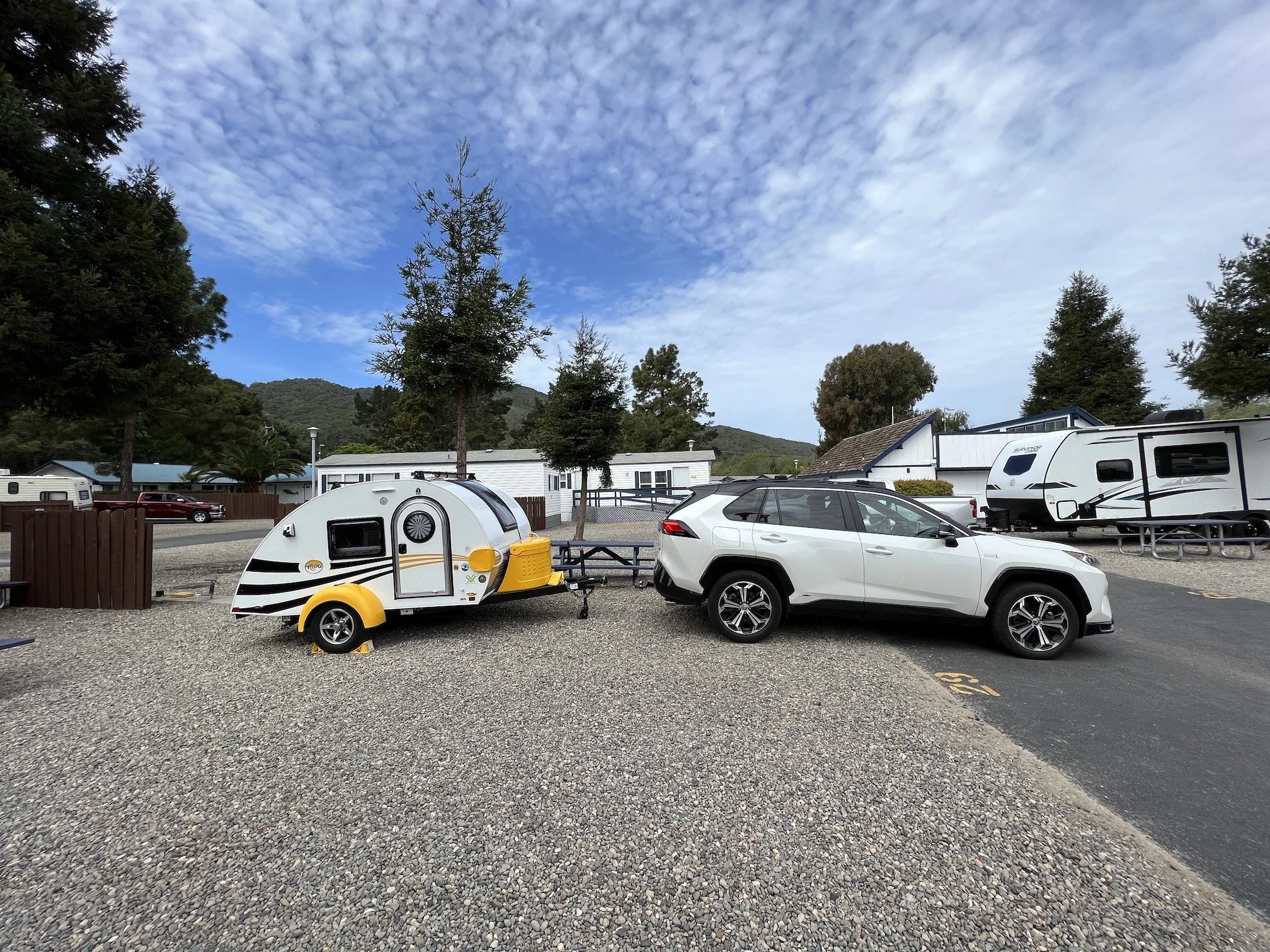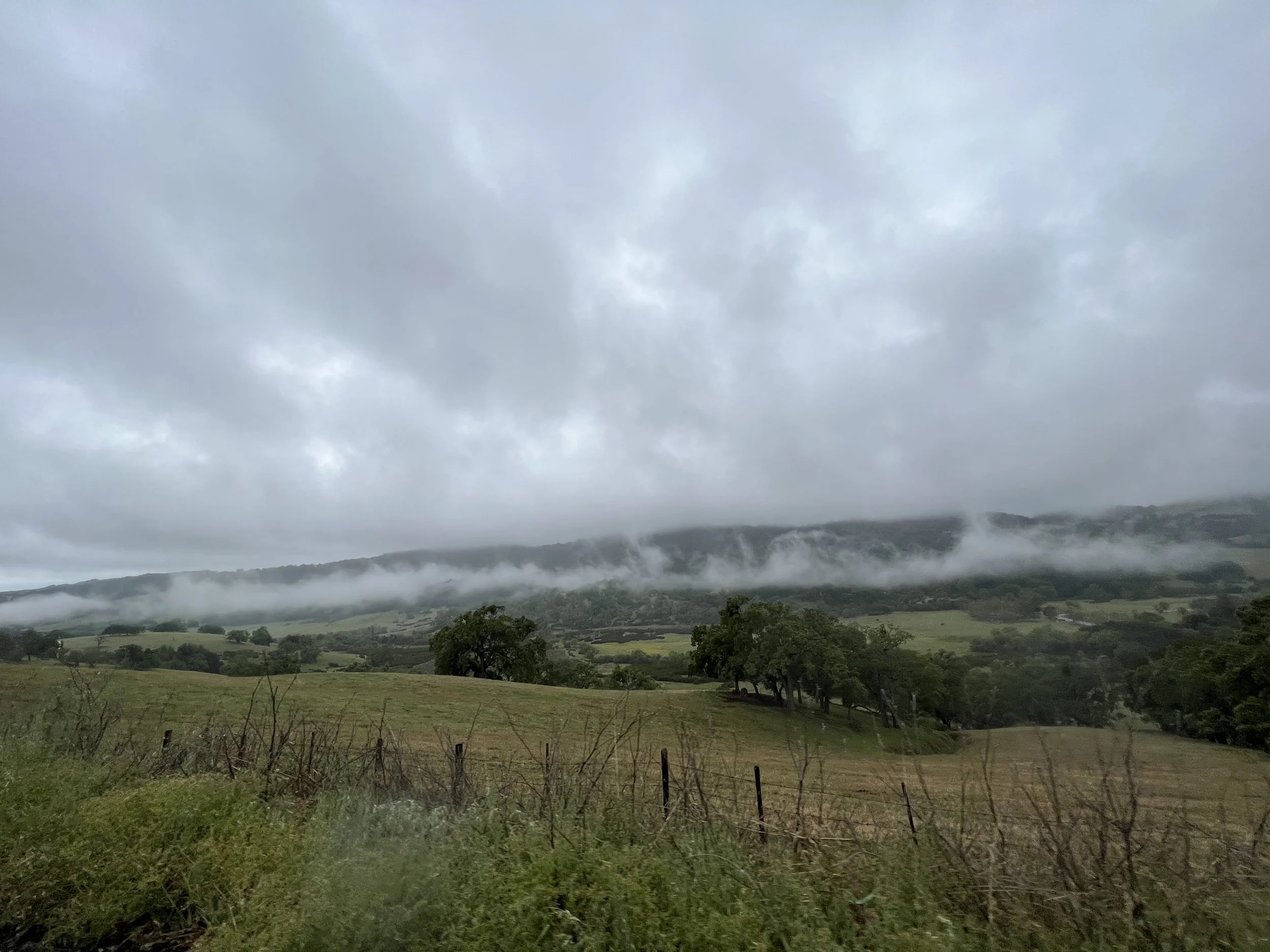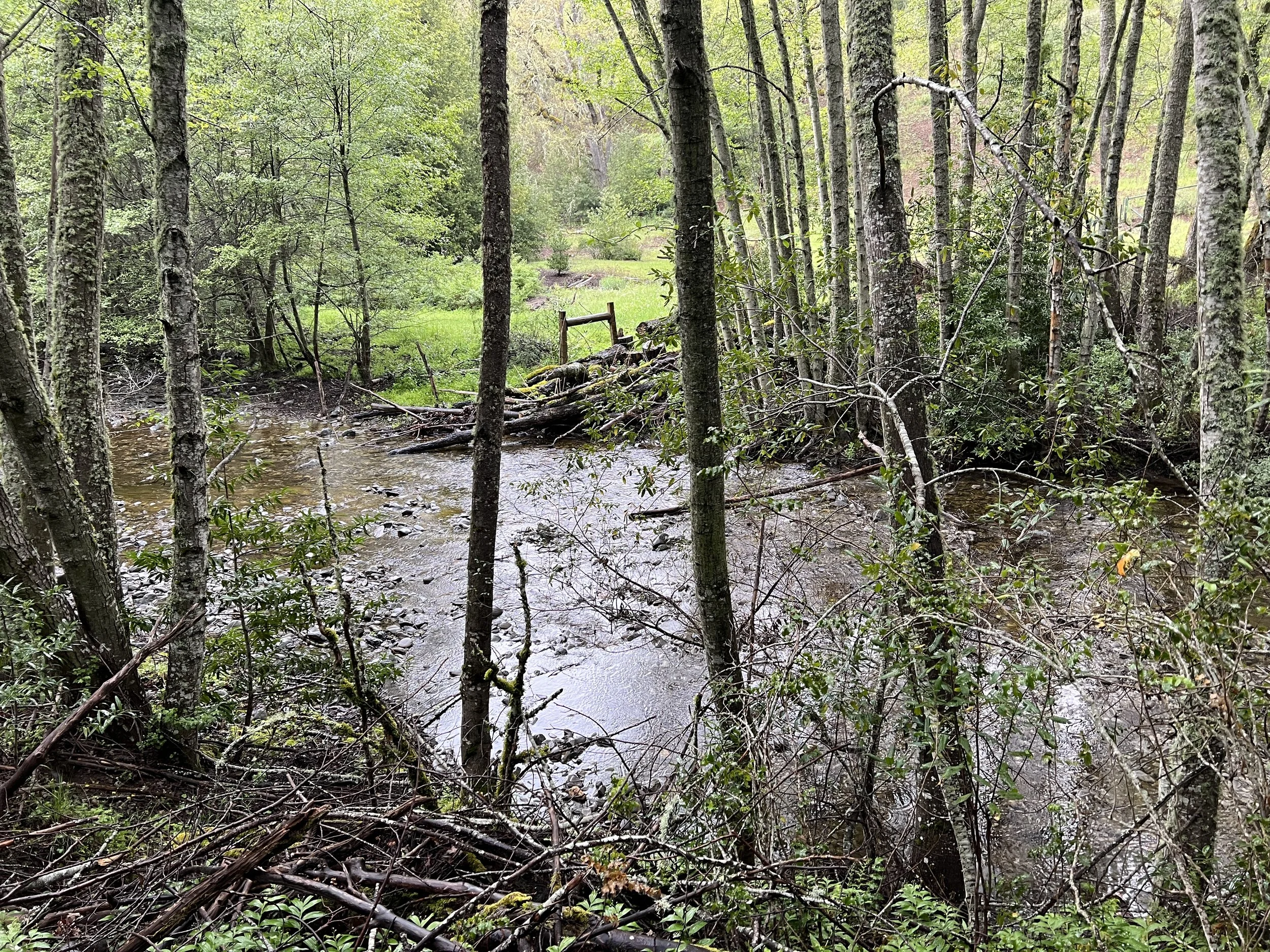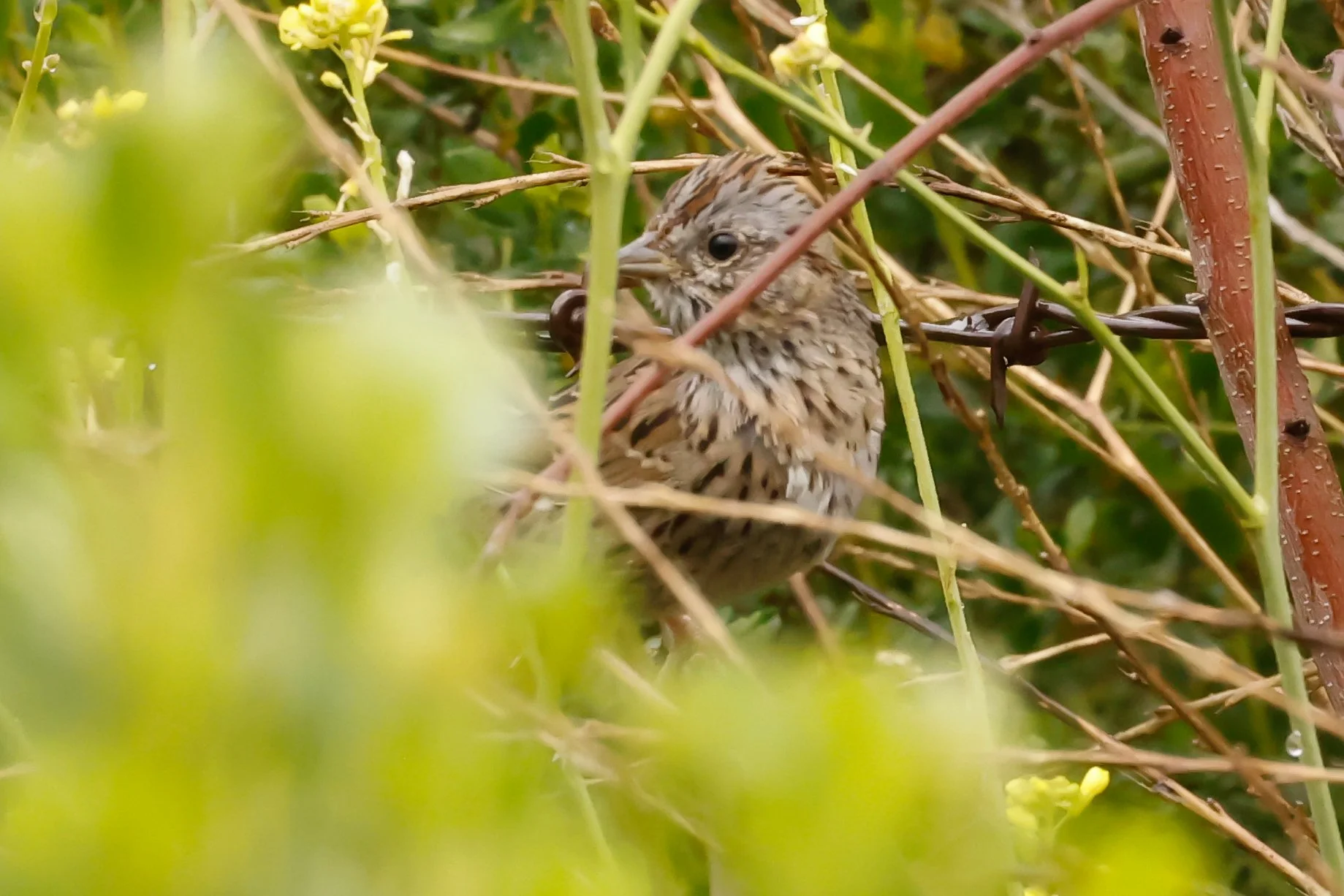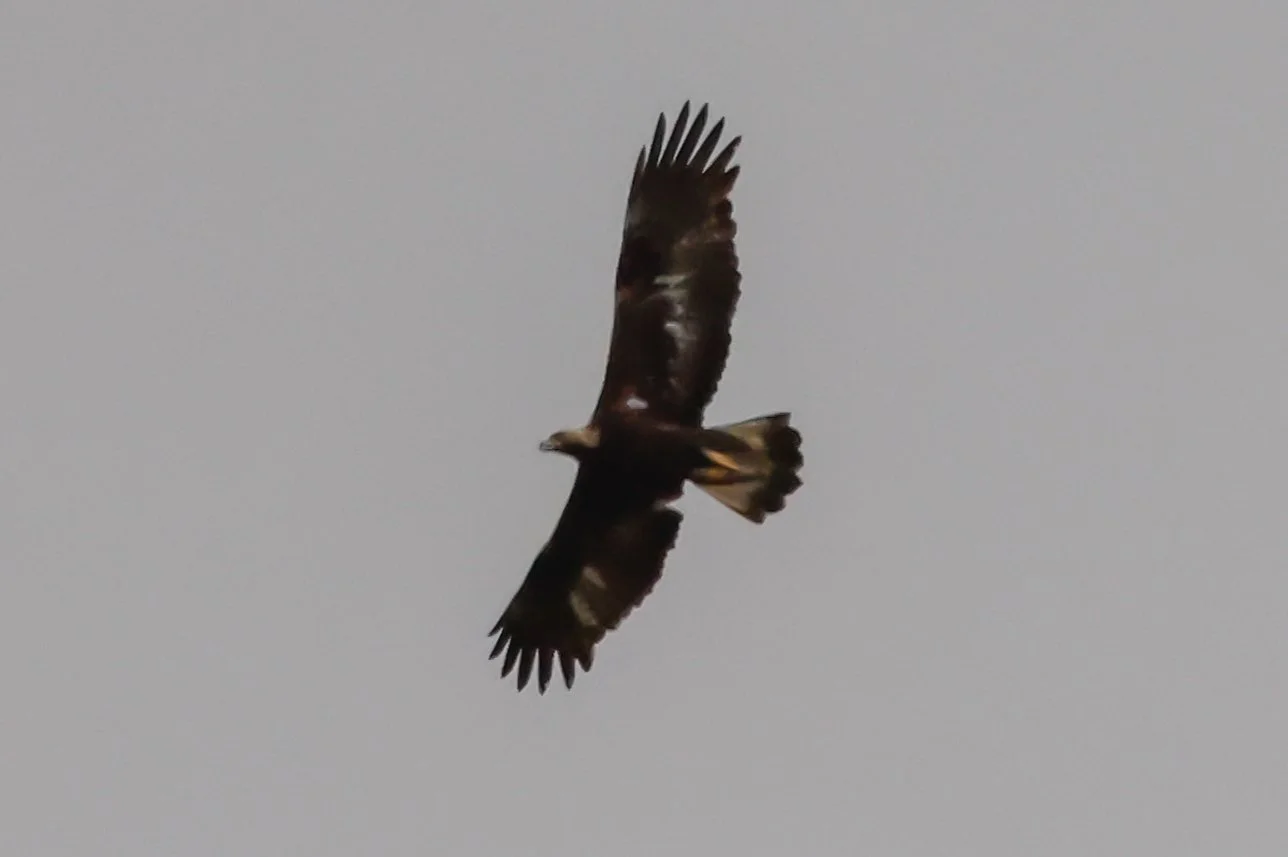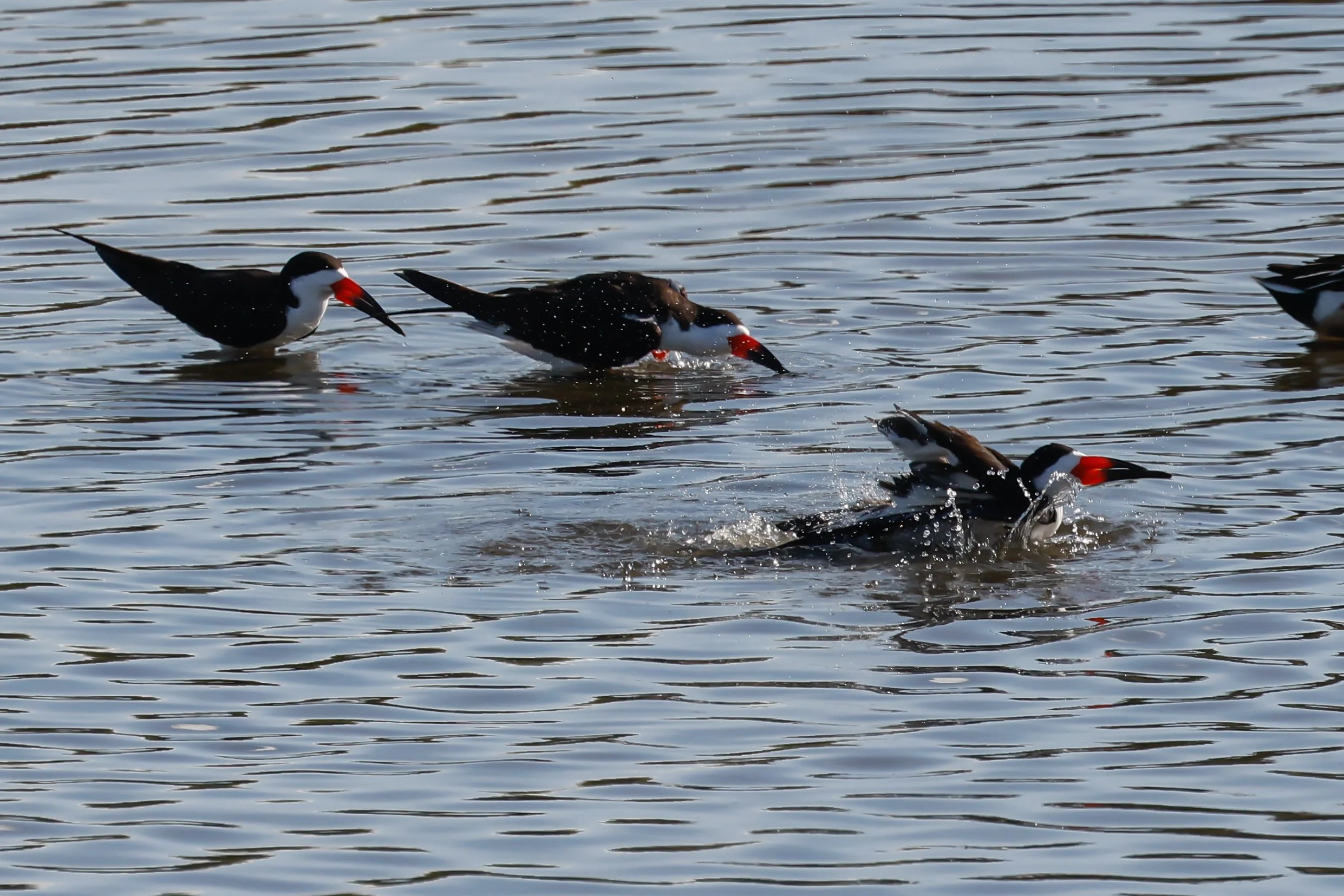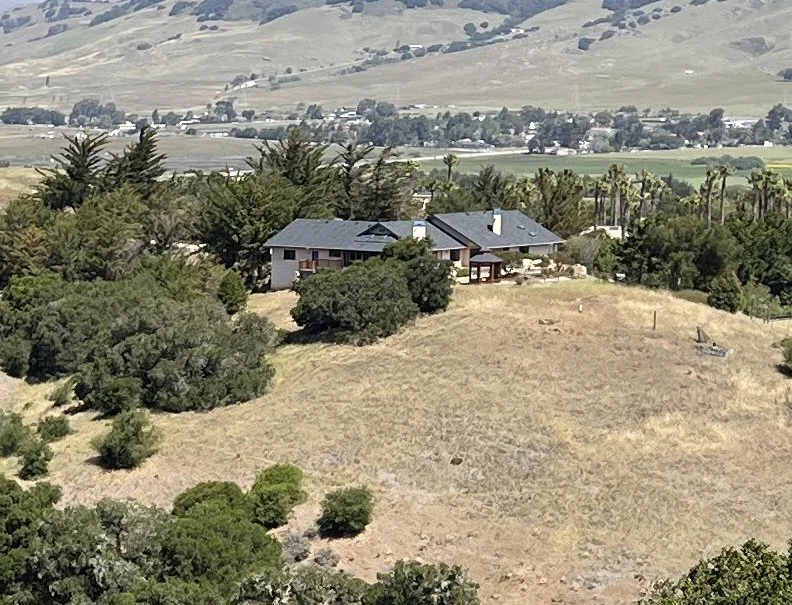The Piratical Flycatchers Big Day
Earth Day, Friday, 22 April 2022
by Barry Langdon-Lassagne
This trip report first appeared on the SCVAS website at Birdathon Stories.
A frequent issue in our (hold on…) life these days (just a sec…) has been (yeah, you guessed it) interruptions. Perhaps we're involved in too many things. Perhaps it's just the relentless emails, texts and phone calls from spammers and marketers. Perhaps it's because leading up to this year's Birdathon, we bought a house in San Luis Obispo County.
Panorama of San Luis Obispo County, from the Irish Hills
It's probably the house. The first big interruption to our Birdathon Big Day was when we got notification that our closing date was changed from the 20th to the 18th, which meant we had to reschedule The Piratical Flycatchers to make room for this huge life-changing purchase. We were planning on camping at Joseph D. Grant County Park (aka Grant Ranch) from the 17th to the 19th and starting/ending the Big Day from our campsite. Instead, we towed the teardrop trailer down to San Luis Obispo and camped at a KOA from the 15th to the 18th. On the 18th we spent our first night in our new home!
Camping at the KOA
For the moment we have two residences: one in Sunnyvale and one in San Luis Obispo. We will be in this situation for about a year, as we slowly make the transition to our new SLO life. It's complicated and exhilarating at the same time. All the details of home purchasing mean a lot of interruptions in our lives: we've been dealing with the credit union, the title company, the realtor, insurance companies and inspectors. We have been transferring the electricity, the gas, the water, the garbage, the security system, the internet into our name. And here in Sunnyvale we've been figuring out how to unwind our lives from a place that has been home for over 30 years.
So instead of camping on Mount Hamilton, we explored our new property and we cleaned and repaired and we planned and we met our new neighbors. On the 19th we spent our second night in our SLO home. On the evening of the 20th, we drove back to Sunnyvale, got a reasonable night's sleep and then revised and finalized our Birdathon plans.
Earth Day 2022 started dark and rainy as we zigzagged up the Mount Hamilton foothills on Quito Road. There our souls were lifted by the sight of a Yellow-billed Magpie on a telephone wire. This crow-sized bird is strikingly black and white and a specialty of the East Hills. In the dim rainy light it still looked spectacular.
Yellow-billed Magpie on Quito Road
Once we crested that first set of hills, Quito Road took us down into the wilderness of Grant Ranch and out of cell phone range. For now, we could enjoy a time with no interruptions other than whatever surprises Nature had in store for us.
Rainy and foggy on Mount Hamilton Road
Barry and Ginger at the start of our adventure
Black Phoebe in the rain at the Smith Creek bridge (click to zoom)
We worked our way up the mountain, past the campsite where we didn't camp, all the way up to Smith Creek. This is where we have started our Birdathon on several occasions, including last year. One year it even lightly snowed on us here; this time it rained. Not heavy rain, but enough to soak our outer layers and keep us moving to keep warm.
The creek was quite full and flowing and it was there that a fluttering of wings and loud "Oo-eek!" calls caught our attention and we had a brief look as a pair of Wood Ducks fled further downstream. Wood Ducks are notoriously shy birds; they noticed us long before we noticed them even though we were being fairly quiet and walking slowly and the creek was a good dozen yards downslope from us. Our eBird checklist has audio from the birds taking flight, including Ginger's intake of breath as we realized what was making that peculiar sound.
Smith Creek swollen from the rain
At Smith Creek we were looking for a few rarities that were either recently reported in this location, such as the Nashville Warbler and Hammond's Flycatcher, or that we had seen here in previous years, such as MacGillivray's Warbler. We found none of these birds this time, but neither that nor the rain dampened our spirits. We found joy in the birds we did find such as Blue-gray Gnatcatcher, Black-headed Grosbeak and Lincoln's Sparrow.
Lincoln’s Sparrow near the Smith Creek Fire Station
Next we drove a short way down the mountain to the Twin Gates parking area. The rain let up and the sun began to peer between the clouds and the birds started singing in profusion. We followed the birdsong up the road to a spot overlooking the creek and there we spent a solid half hour in wonder as bird after bird became active: calling, collecting food, flitting from branch to branch. Many were paired off for breeding. Clearly they were all delighting in the first warm dry moments of the day, just as we were. What was most amazing was the species diversity in such a small area: Spotted Towhee, Lazuli Bunting, Western Tanager, Cassin's Vireo, White-breasted Nuthatch, and the highlights of our day: Yellow-rumped Warbler, Wilson's Warbler, Orange-crowned Warbler, Black-throated Gray Warbler, and Hermit Warbler. Ginger's favorite birds are warblers, I think they're pretty cool too, and to see five species in one spot all at once was truly amazing. Here are a few photos from this moment.
Western Tanager
Cassin’s Vireo
Orange-crowned Warbler
Wilson’s Warbler
Yellow-rumped Warbler
Black-throated Gray Warbler
Hermit Warbler
Further down the mountain we stopped at the ranch house, where we changed into drier clothes and found to our dismay that we had left our freshly-brewed thermos of coffee behind! Guess we got interrupted on our way out the door. We did manage to pack snacks though, so we breakfasted and then tried unsuccessfully to find the Vermilion Flycatcher, a rarity that's now been seen at this location for three year's running. However, we found other birds that made this stop more than worthwhile and made up for the lack of coffee: Wild Turkey, Lawrence's Goldfinch, American Goldfinch, Lark Sparrow, Pacific-slope Flycatcher, Western Kingbird, Hermit Thrush and another warbler for the day: Yellow Warbler.
Lawrence’s Goldfinch at the ranch house
Yellow Warbler
American Goldfinch
Pacific-slope Flycatcher
Wild Turkey at Grant Ranch
Hermit Thrush
Next was a quick stop at Grant Lake where we picked up a few expected birds and had great looks at a Bald Eagle carrying a fish as it flew over the lake. We also had a Golden Eagle here.
Bald Eagle with fish prey
Golden Eagle
We left the East Hills without ever hearing a Wrentit call or seeing a California Thrasher, both common birds in chaparral hills. We also failed to find the less common Grasshopper Sparrow or Rufous-crowned Sparrow. These misses were likely due to the rainy conditions for most of our time in this habitat. Now it was time to head to the Baylands, where a panoply of different birds awaited.
Down by the Bay we started at the Don Edwards National Wildlife Refuge, Environmental Education Center, known colloquially by birders as the "Alviso EEC." It began to get windy, and our hike to the large salt pond A16 was halted by trail closures for construction. The sign said that work was estimated to be done by January 2024; well, I don't think we can wait that long :-). This work is part of a massive effort to restore our wetlands (which had spent a century as evaporation ponds producing salt), and to provide a flood-control buffer between the Bay and South Bay cities. You can read more about the work and watch a short video in this CBS News article. Valley Water, who is overseeing the project, also has a nice summary of the work.
Hindered by the construction at Alviso, we only got a few good birds to expand our day list; a flyover Wilson's Snipe was a nice surprise, and we managed to identify some very-distant American White Pelicans. The highlight of this stop was actually a Gray Fox who crossed the road in front of us and barked at us from the underbrush as we were scanning Mallard Slough for ducks and shorebirds. Apparently we interrupted his nap!
On the way to Shoreline Lake we searched in vain for Burrowing Owls, but at the lake we found several other birds including some expected Great-tailed Grackles, a fairly recent resident species that was first recorded in our county around 1984, and a huge flock of Black Skimmers nesting on the island in the middle of the lake. Skimmers are another relative newcomer to Santa Clara County, first nesting here in 1994.
Great-tailed Grackle
Black Skimmers in flight over Shoreline Lake
Black Skimmers in the Coast Casey Forebay
Black Skimmers hunt by dipping their extremely-long lower mandible into the water as they fly along and ‘skim’ until they catch a fish. This time around, no fish were caught
We hiked out from Shoreline Lake past Salt Pond A1 to Charleston Slough where we found Clark's and Western Grebes, and a single Black-crowned Night-Heron. There's construction going on here too; shoring up the levee between Shoreline Lake and the Coast Casey Forebay, but we were able to navigate around it.
Black-crowned Night-Heron at Adobe Creek next to Charleston Slough
California Gull
Song Sparrow singing next to Salt Pond A1
Next we headed to Palo Alto Baylands to catch the incoming tide and boost our shorebird list. We briefly stopped at Byxbee Park hoping to hear, but not hearing, any rails.
Barn Swallow at Palo Alto Baylands
Shorebirds (Whimbrel, Dunlin, Willet & peeps) at Palo Alto Baylands
Lastly, we birded the ponds at Emily Renzel Wetlands, picking up Common Gallinule, Green Heron and White-tailed Kite, but not the Blue-winged Teal that we had hoped for.
Swallows feeding over the south pond at Emily Renzel Wetlands
We watched the sunset from the ponds and decided that we were not likely to find any more birds in the dark; also, our phone, camera and walkie-talkie batteries had all run out and we had no energy to drive up the West Hills to listen for owls, so we called it a day and made our way back home.
Green Heron hunting at Emily Renzel ponds
Common Gallinule
Sunset at Emily Renzel Wetlands — the end of our long birding day
This is a time of change for us, with reflections on the past and anticipation for the future. We've lived in our little house in Sunnyvale since before the Black Skimmers started breeding in the San Francisco Bay. At our Sunnyvale home we've observed over seventy-five species of birds in the course of 30 years, which is pretty impressive for a tiny green patch in suburbia.
Suburban Sunnyvale
But we've only spent a total of seven nights in our new home in San Luis Obispo and we already have 55 species of birds there! In addition, we have seen Mule Deer, Dusky-footed Woodrats, Gray Foxes, and the previous owner sent us a 2019 nature camera photo of a Mountain Lion from the creek below the house (I now have a naturecam set up in the same spot—we'll see what we get). And then there're the trees: Coast Live Oak, Western Sycamore, California Bay Laurel, Toyon, Buckeyes, willows, poplars… and the flowers: Chocolate Lily, Arroyo Lupine, Hummingbird Sage, Dot-seed Plantain and others common and rare. For the first time, we are stewards of a precious piece of California land connected to vast areas of open space. Our goal is to foster it, to restore it, to enable it to thrive and it, in turn, may enable us to thrive as well.
Home in San Luis Obispo County
Our final tally for the day was 124 species, four more than our goal. Our complete list of birds and all of our individual eBird checklists along with lots more photos of birds can be found in our eBird Trip Report. It was a satisfying day outdoors and a nice break from the responsibilities that we've brought upon ourselves. Okay, we gotta get back to our texts, emails and Zoom meetings. Thanks for reading and thanks to all of you who sponsored our team this year! Here's wishing you the joys of Nature and perhaps a few moments with no (bzzzzzzz-ding!) interruptions.
Barry & Ginger Langdon-Lassagne
The Piratical Flycatchers
~
